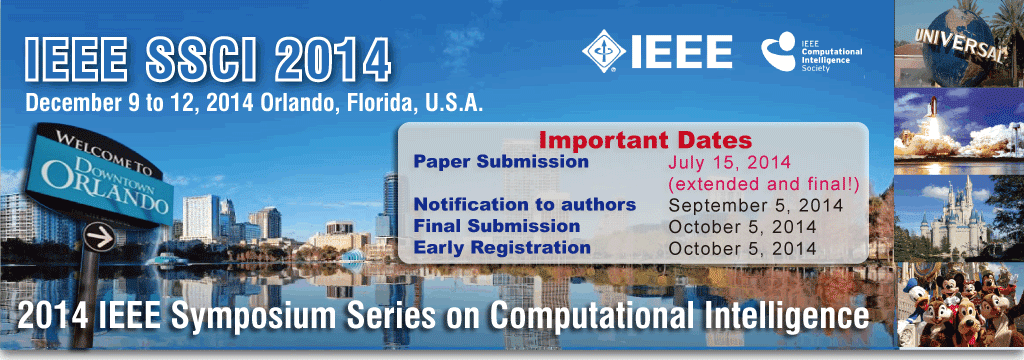- Home
- Final Submission Guidance
- Registration
- Program
- Presentation Guidelines
- Paper Submission
- Important Dates
- Organizing Committee
- Call for Special Sessions
- Call for Papers
- Plenary Speakers
- Keynote Speakers
- Special Sessions
- Doctoral Consortium
- Travel Grants
- Venue
- Accommodation
- Exhibitors
- Local Information
- Contact Us
2014 IEEE Symposium on Computational Intelligence,
Cognitive Algorithms, Mind, and Brain
Computational Intelligence (CI) has for many years drawn inspiration from the brain to produce data and signal processing techniques and systems which are capable of learning, evolving, adapting, self-organizing, communicating effectively with humans and machines and controlling complex systems. Brain-inspired methods are now widely used to process data produced by the brain with the aim of improving our understanding of how the brain functions and produces the remarkable intelligence exhibited by humans, which is yet elusive for computational systems.
Topics
This Symposium focuses on several core topics associated with cognitive algorithms, mind and brain, which are deemed to be of critical importance as we progress into the 21st century.
- Brain-Computer Interfaces (BCIs): BCI technology enables communication from brain to computer. It would help to those who require alternative communicatory mechanisms because of neuromuscular deficiencies and speed up communicating with computers for everybody. There is a significant progress in translating speech to text, and extracting cognitive signals from EEG. Still the problem is not solved.
- Computational models of brain and mind: Mathematical and neurocomputational models are contributing to the understanding of the brain-mind relations, psychological mechanisms, and unsolved mysteries. Cognitive algorithms based on these models significantly improve classical engineering solutions, and solve problems that could not be solved previously. These models can be helpful in therapy.
- Cognitive Robotics: Developing robots for assistive devices and industrial applications is a key area of Computational Intelligence research. How the robot develops its own understanding of the world. Brain-inspired cognitive robotics become increasingly popular and lead to various breakthroughs in the field of autonomous systems designs and implementations.
- Language and Cognition: Progress in many key areas of modeling the mind critically depends on understanding of interaction between language and cognition. Does language serve for communicating complete thoughts? Or do we think with words and phrases? If learning language and cognition depend on each other, why a child learns language early in life, but learning cognition takes much longer? We should build BCI and Cognitive Robots by taking advantage of human mechanisms of interacting language and cognition.
In general, we are interested in dynamic brain models and brain-inspired methods which help solving problems in psychology and cognitive science, integrate signals from different domains, help in recognition and prediction. Topics of interest include
- Cognitive mathematical models and experimental predictions
- Cortical dynamics, theory & experiments
- Brain-computer interface
- Autonomous robot control
- Visual and audio perception
- Language and cognition interaction
- Brain rhythms and their cognitive relevance
- Extracting cognitive events from EEG signals
- Embodied cognition modeling
- Models of cognitive dissonance and its functions in cognition
- Neural Modeling Fields (NMF) and dynamic logic
- Cognitive robotics
- Perceptual processing
- Evolutionary and multi-agent modeling
- Psychological and neurological disorders
- Emotional and cognitive algorithms
- Models of higher abilities of the mind
- Aesthetic and musical emotions and their function in cognition
- Emotions of language prosody and their functions in cognition
- Evolution of languages and cultures
- Socio-cultural modeling
Keynote, Tutorial and Panel Sessions
Please forward your proposals with detailed abstract and bio-sketches of the speakers to Symposium Co-Chairs and SSCI Keynote-Tutorial Chair Dr D. Liu.
Special Sessions
Please forward your special session proposals to Symposium Co-Chairs.
Symposium Co-Chairs
 |
Leonid PerlovskyHarvard University and Air Force Research Laboratory, USA |
|---|---|
 |
Jose F FontanariUniversity of Sao Paulo, Brazil |
 |
Angelo CangelosiPlymouth, UK |
 |
Daniel LevineUniversity of Texas, Arlington |
 |
Robert KozmaThe University of Memphis, USA |
Advisory Committee
- Henry Hexmoor, SIU, USA
- Donald C. Wunsch II, USA
Program Committee (tentative list)
- Michel Cabanac, Canada
- Ross Deming, USA
- Jose Fontanari, Brazil
- John Gan, Essex, UK
- Nikola Kasabov, New Zeeland
- Boris Kovalerchuk, USA
- Gary Kuvich, USA
- Roman Ilin, AFRL, USA
- Nobuo Masataka, Japan
- Alexander Mehler, Germany
- Chin-Teng Lin, NCTU, Taiwan
- Igor Ternovskiy, USA
- Jürgen Schmidhuber, Switzerland
- Simon Streltsov, USA
- Walter Weisse, Rhode Island, USA
- Paul Werbos, USA
- Donald C. Wunsch II, USA
- Yair Neuman, Israel
Top
Welcome to IEEE SSCI'14 in Orlando, Florida, December 9 to 12, 2014
Copyright © 2014 IEEE Symposium Series on Computational Intelligence
